
When the stakes are life and death, as they so often are with cancer, one would hope for a rigorous analysis of all available options. Until recently, this was not the case with the disease.
That’s where Austrian-born Franziska Michor comes in. Franziska is a professor of computational biology at the Dana-Farber Cancer Institute and Harvard School of Public Health. Equally comfortable with mathematics and evolutionary biology, she combines both to create mathematical models of natural phenomena within cancer for a better understanding of its genesis, growth, and responses to treatments.
Most notably, Franziska works with clinicians to develop more effective treatments. In one case, she collaborated with oncologist Eric Holland at the Memorial Sloan-Kettering Cancer Center to develop an alternative radiation schedule for patients with glioblastoma, a deadly form of brain cancer. Using models based on the rates at which cells divide and die in response to radiation, she predicted a more effective schedule of treatment. This schedule has been proven to be twice as effective per dose unit in mouse models, and clinical trials are now being planned at MSKCC.
Given both the theoretical and clinical aspects of her work, Franziska has chosen the Dana-Farber Cancer Institute in Boston as her home base. There, she mixes with researchers, physicians, and, most importantly, with cancer patients themselves.
In this way, she is her parents’ daughter: The child of a theoretical physicist and a nurse, Franziska developed many skills early in life — ballroom dancing, horseback riding, even truck driving. Perhaps the most influential part of her upbringing, however, was exposure to math and sciences, as well as insight into the impact of both on human lives. “Basically, [my father] was showing us that science is really great, and [my mother] was showing us that there is a very important humanitarian aspect to it,” she says. “Somehow I got the impression that it would be enormously great if I could do something in medicine by using math.”
Putting this into practice was more difficult. She completed degrees in molecular biology and mathematics in Austria, but grew frustrated with the divide between mathematicians and biomedical scientists during her postgraduate studies. “I wanted to use my skills as a mathematician to make a difference in biomedical sciences, and not describe biology from a distance as idealized models that had nothing to do with reality, and [that] would never change the way a surgeon or oncologist thinks about clinical practice,” she says.
Franziska decided to blaze her own trail instead by collaborating with clinicians, and she was enthralled by the possibilities that opened up. “It was almost like you could move into the field and ask any question you wanted and no one would have thought about it before,” she remembers. Franziska’s work was so revolutionary that she sometimes had trouble publishing in peer-reviewed journals — it was hard to find reviewers who were well versed in all of the disciplines she combined in her publications.
That is one of the reasons she is glad to call Boston her new home. “What I love about the U.S. is that people are not risk averse,” she says. “In Europe, you have to be very convinced that something is going to work before you try it, because it’s hard to get resources and it’s a very hierarchal system. My past took a lot of twists and turns, and that has never been a problem here.”